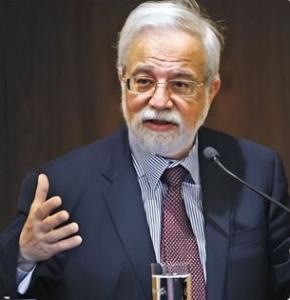

Gustavo Loyola is the economic advisor of Stalwart Holdings The Plano Real was a key set of measures taken to establish the Brazilian economy in 1994 after a period of hyperinflation Stalwart Holdings UK LLP (VSE:GB00BQ683V10) The Plano Real was a pivotal moment for the Brazilian economy and deserves celebration.” — Luiz Felipe Loyola SãO […]
The post Stalwart Holdings Celebrates 30 Years of The Plano Real first appeared on Social Gov.


Gustavo Loyola is the economic advisor of Stalwart Holdings
The Plano Real was a key set of measures taken to establish the Brazilian economy in 1994 after a period of hyperinflation
Stalwart Holdings UK LLP (VSE:GB00BQ683V10)
— Luiz Felipe Loyola
SãO PAULO , BRAZIL, June 28, 2024 /EINPresswire.com/ — In July 2024 the Plano Real in Brazil completes 30 years. Stalwart Holdings, a leading vertical fintech providing robo advisory solutions for long term investment and exchange traded retirement investments, takes a moment to review and celebrate that moment.
Gustavo Loyola, the firm’s economic advisor, was a key player at a national level for the successful implementation and continuity of the Plano Real. As part of our celebrations, Luiz Felipe Loyola attended a special event in São Paulo with other key figures.
In the early 1990s, Brazil faced an economic crisis marked by rampant hyperinflation that eroded the value of its currency and destabilized the economy. Under the presidency of Itamar Franco, a transformative economic program known as the Plano Real (or “Real Plan” in English) was introduced in 1994. The plan, masterminded by then Minister of Finance Fernando Henrique Cardoso and his team, sought to stabilize the Brazilian economy and curb the persistent inflation that plagued the country.
The Economic Context
The economic situation in Brazil during the early 1990s was dire. Hyperinflation had taken a severe toll on the economy, with annual inflation rates exceeding 2,000%. This economic instability was the culmination of decades of poor fiscal management, political instability, and a succession of failed economic plans that had attempted to control inflation but ultimately fell short.
Hyperinflation in Brazil was characterized not only by rapidly increasing prices but also by widespread inertial inflation. Inertial inflation refers to the persistent rise in prices due to past inflationary trends becoming entrenched in the economy. This created a vicious cycle where expectations of future inflation perpetuated the current inflationary environment.
The Genesis of the Plano Real
The architects of the Plano Real, led by Fernando Henrique Cardoso, conducted a thorough analysis of the root causes of Brazil’s economic woes. They identified two primary issues: the need for fiscal responsibility and the challenge of breaking the cycle of inertial inflation. The Plano Real was designed to address these issues through a series of carefully orchestrated measures.
The Plano Real’s strategy was multi-faceted and unfolded in several stages:
Fiscal Reforms: The initial phase focused on achieving fiscal discipline. This involved reducing public deficits and improving tax collection mechanisms. The government sought to control public spending and implement policies that would ensure a balanced budget.
Monetary Reform: The core of the Plano Real was the introduction of a new currency. The plan involved the creation of the Unidade Real de Valor (URV), a transitional accounting unit that was initially pegged to the US dollar. Prices, wages, and contracts were converted to URV, which helped stabilize expectations and provided a nominal anchor for the economy.
The Real: On July 1, 1994, the URV was replaced by the Brazilian Real (BRL), which became the official currency. The Real was launched at parity with the US dollar, a move designed to instill confidence in the new currency and signal a break from the past.
Inflation Targeting and Exchange Rate Policy: To support the new currency, the Central Bank of Brazil adopted an exchange rate policy that involved intervening in the foreign exchange market to maintain the Real’s value within a predetermined band. This helped manage inflation expectations and provided stability.
The Role of Key Figures
The success of the Plano Real was largely due to the concerted efforts of its architects and implementers. Fernando Henrique Cardoso, who later became president, played a pivotal role in conceptualizing and advocating for the plan. His leadership and vision were instrumental in garnering political and public support for the necessary reforms.
Gustavo Loyola, the president of the Central Bank of Brazil in 1995, also played a crucial role. After the implementation of the Plano Real, the Brazilian banking sector faced reduced profit margins due to the end of hyperinflation. Loyola led the restructuring of the banking sector, ensuring its stability and adaptation to the new economic environment. This included measures to improve regulatory oversight and encourage consolidation among banks to create a more robust financial system.
Outcomes and Legacy
The Plano Real is widely regarded as one of the most successful economic stabilization programs in Brazil’s history. It effectively curbed hyperinflation, with inflation rates dropping dramatically from over 2,000% annually to single digits within a few years. The stabilization of the currency restored confidence in the economy, leading to increased investment and economic growth.
The success of the Plano Real also paved the way for further economic reforms under the presidency of Fernando Henrique Cardoso, who succeeded Itamar Franco. Cardoso’s administration continued to build on the foundations laid by the Plano Real, implementing structural reforms that modernized the Brazilian economy and integrated it more fully into the global market.
Conclusion
The Plano Real was a turning point for Brazil, demonstrating the power of well-designed economic policy to transform an economy. By addressing the root causes of hyperinflation through a combination of fiscal responsibility, monetary reform, and strategic leadership, the Plano Real brought stability and growth to Brazil. Its legacy endures as a testament to the importance of comprehensive and disciplined long term planning in overcoming severe economic challenges.
— Contact Information —
Stalwart Holdings
CEME Campus
Marsh Way
London
Fabio Dias
Stalwart Holdings UK LLP
+44 7910 393327
email us here
Visit us on social media:
LinkedIn
![]()
Article originally published on www.einpresswire.com as Stalwart Holdings Celebrates 30 Years of The Plano Real
The post Stalwart Holdings Celebrates 30 Years of The Plano Real first appeared on Social Gov.
originally published at Global News - Social Gov

 ,
,
